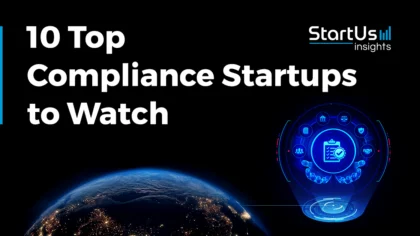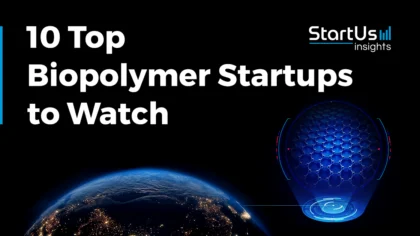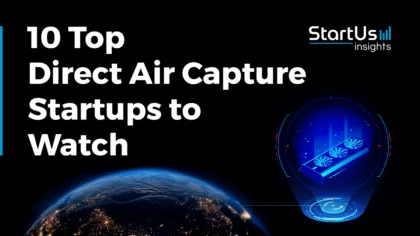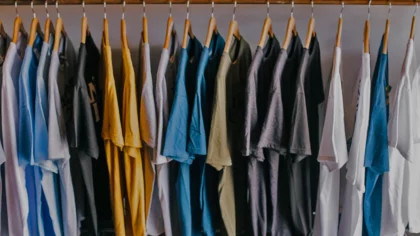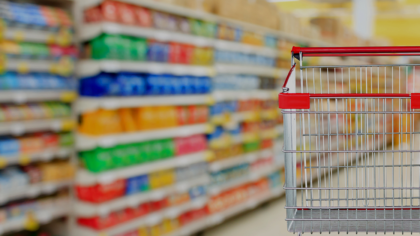Accelerate Productivity in 2025
Reignite Growth Despite the Global Slowdown
Integration of emerging technologies such as artificial intelligence (AI), big data, and blockchain into retail processes addresses challenges in operational efficiency and elevates customer experience. For example, big data and analytics enhance decision-making through predictive analytics, while augmented reality (AR) and virtual reality (VR) revolutionize the customer shopping journey. Startups are leading the way in these retail technology advancements.
US-based startup Netail deploys AI to optimize pricing strategies and inventory allocation. Whereas, R Reflections is a startup from the UK that uses AR to offer virtual try-ons. As the retail landscape evolves, key business decision-makers must incorporate these latest tech-driven solutions into their businesses to solve immediate challenges and build a foundation for sustained growth and innovation.
Why should you read this report?
- Gain in-depth insights into the top 10 technologies impacting retail.
- Learn about three practical use cases for each technology.
- Meet 10 innovative startups advancing these technologies.
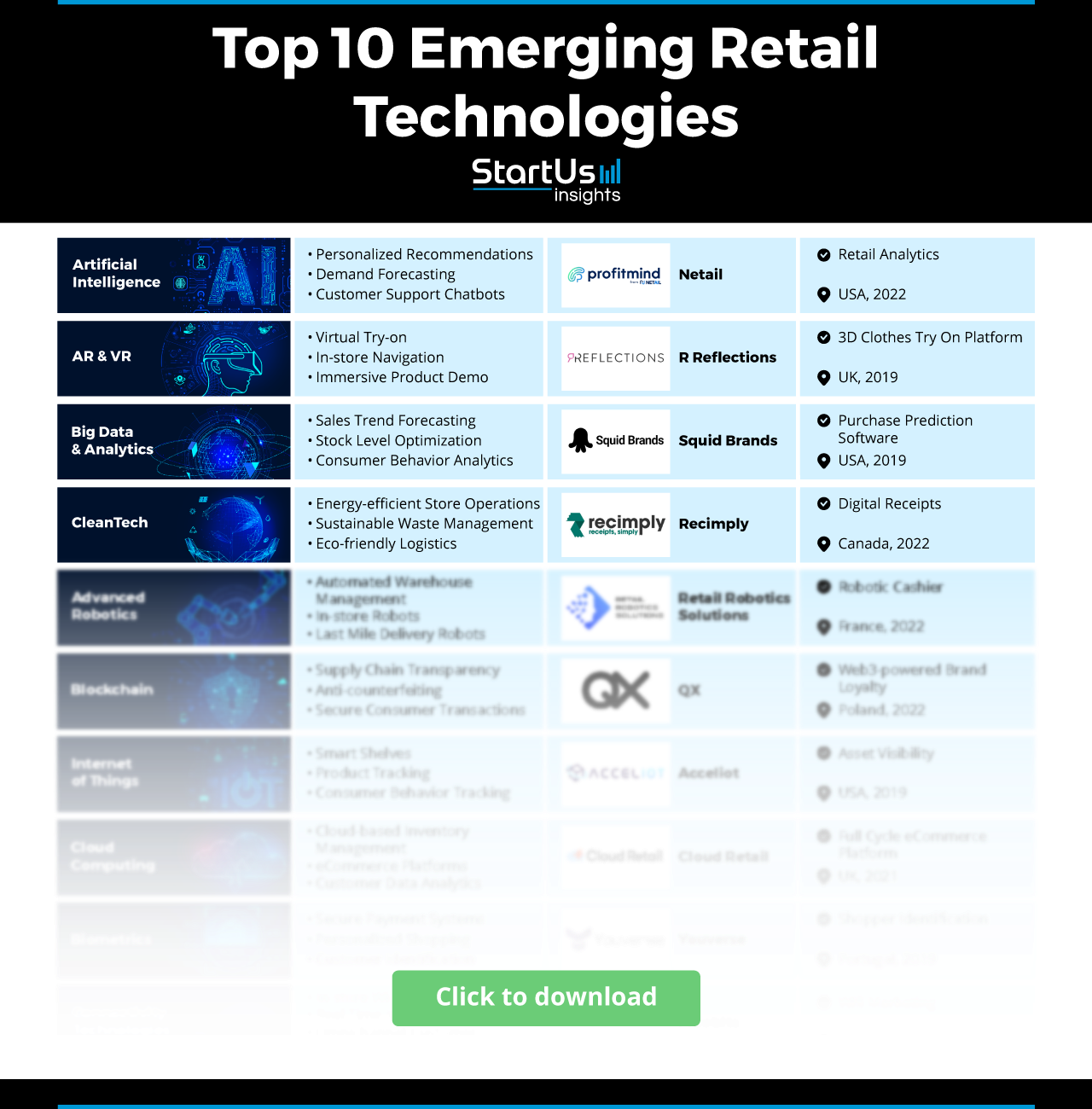
Key Takeaways
- Artificial Intelligence
- Use Cases:
- Personalized Recommendations
- Demand Forecasting
- Customer Support Chatbots
- Startup to Watch: Netail
- Use Cases:
- Augmented Reality & Virtual Reality
- Use Cases:
- Virtual Try-Ons
- In-Store Navigation
- Immersive Product Demos
- Startup to Watch: R Reflections
- Use Cases:
- Big Data & Analytics
- Use Cases:
- Sales Trend Forecasting
- Stock Level Optimization
- Consumer Behavior Analytics
- Startup to Watch: Squid Brands
- Use Cases:
- CleanTech
- Use Cases:
- Energy-Efficient Store Operations
- Sustainable Waste Management
- Eco-Friendly Logistics
- Startup to Watch: Recimply
- Use Cases:
- Advanced Robotics
- Use Cases:
- Automated Warehouse Management
- In-Store Robots
- Last-Mile Delivery Robots
- Startup to Watch: Retail Robotics Solutions
- Use Cases:
- Blockchain
- Use Cases:
- Supply Chain Transparency
- Anti-Counterfeiting
- Secure Consumer Transactions
- Startup to Watch: QX
- Use Cases:
- Internet of Things (IoT)
- Use Cases:
- Smart Shelves
- Product Tracking
- Consumer Behavior Tracking
- Startup to Watch: Acceliot
- Use Cases:
- Cloud Computing
- Use Cases:
- Cloud-based Inventory Management
- eCommerce Platforms
- Customer Data Analytics
- Startup to Watch: Cloud Retail
- Use Cases:
- Biometrics
- Use Cases:
- Secure Payment Systems
- Personalized Shopping
- Customer Identification
- Startup to Watch: Youverse
- Use Cases:
- Connectivity Technologies
- Use Cases:
- In-Store Wi-Fi & Connectivity
- Real Time Inventory Tracking
- Omnichannel Customer Engagement
- Startup to Watch: Freebits
- Use Cases:
Retail Industry FAQs
How big is the retail market?
The global retail market is projected to reach approximately USD 38 trillion by 2032, with a compound annual growth rate (CAGR) of 5.8% over the forecast period. By 2025, the market size is expected to reach USD 38.2 trillion, driven by growth in e-commerce, emerging markets, and innovations in customer experiences.
What are the main challenges retail industry facing today?
Major challenges include supply chain disruptions, shifting consumer expectations, and labor shortages. Additionally, the rapid rise of eCommerce has increased pressure on traditional retailers to adapt their business models while addressing sustainability concerns and keeping pace with evolving technologies.
How is technology changing the retail industry?
Emerging technologies like artificial intelligence, virtual reality, and big data enhance personalization, streamline operations, and improve customer experiences. E-commerce platforms, mobile payments, and data analytics are also reshaping how retailers interact with consumers and optimize their supply chains.
Where We Get Our Data From
StartUs Insights gathers data through its exhaustive Discovery Platform, covering information on 4.7 million startups, scaleups, and tech companies globally, alongside 20,000 emerging technologies and trends. The Discovery Platform accelerates startup and technology scouting, trend intelligence, and patent searches, offering thorough insights into technological advancements. By leveraging the trend intelligence feature for this report, we identified emerging technologies within specific industries. This process allows us to uncover patterns and trends, and pinpoint relevant use cases and the startups creating solutions for each scenario. Additional capabilities and information can be found at StartUs Insights Discovery Platform.
10 Emerging Technologies Impacting the Future of Retail [2025 & Beyond]
1. Artificial Intelligence

AI technologies such as machine learning and computer vision allow retailers to analyze massive datasets, improve decision-making, and automate processes — ranging from personalized customer interactions to dynamic pricing strategies. Generative AI and large language models (LLM) are also simplifying how retailers handle demand forecasting, product recommendations, and inventory management. By integrating these AI-driven technologies, companies optimize supply chains, enhance in-store experiences, and deliver hyper-personalized services that meet evolving consumer expectations.
3 Practical Use Cases of AI in Retail
- Personalized Recommendations: AI algorithms analyze customer data, including purchase history, browsing behavior, and preferences, to deliver personalized product recommendations in real-time. This improves user engagement and drives higher conversion rates by predicting the most relevant products.
- Demand Forecasting: Machine learning models analyze historical sales data, seasonal trends, and external factors like weather. This enables retailers to optimize inventory management, reduce overstocking or shortages, and enhance supply chain efficiency by predicting product demand with high accuracy.
- Customer Support Chatbots: AI-powered chatbots leverage natural language processing (NLP) to handle customer inquiries and provide instant, automated responses to common questions. These chatbots reduce response times, handle repetitive tasks efficiently, and free human agents for more complex queries.
Startup to Watch: Netail
US-based startup Netail offers an AI-powered platform, Profitmind, that enables retailers optimize decisions related to pricing, inventory, and product assortment. By continuously scanning the internet for competitive insights and integrating with retailers’ internal data, the platform highlights opportunities for profit improvement and market growth. One of the key features is price matching – the platform enables retailers to adjust their prices based on real-time competitor data and improve margins without losing market share. It also simplifies inventory optimization by analyzing stock levels to suggest reallocation of resources and reduce overstock or out-of-stock situations. Additionally, retailers use the platform for promotional planning and adjusting discounts and offers based on predicted customer responses.
2. Augmented Reality & Virtual Reality

Immersive technologies, such as augmented reality, virtual reality, and mixed reality (MR), are enhancing how consumers engage with brands and products. AR overlays digital content onto real-world settings to enable interactive shopping experiences. VR immerses customers in fully virtual environments to explore products. MR and XR combine these approaches, blending physical and digital elements to create more dynamic and interactive retail spaces. These technologies improve customer engagement and offer retailers new avenues for personalized experiences and brand loyalty.
3 Practical Use Cases of AR & VR in Retail
- Virtual Try-Ons: AR and VR allow customers to visualize clothing, accessories, or makeup in real-time through digital overlays. This, coupled with 3D modeling and computer vision, enable retailers to reduce product returns, enhance personalization, and improve customer satisfaction through accurate fit and style representation.
- In-Store Navigation: MR and AR facilitate in-store navigation by overlaying digital directions onto physical environments. Utilizing spatial computing and AI-powered analytics, these systems guide customers to desired products for optimizing foot traffic, enhancing shopping efficiency, and boosting overall store engagement.
- Immersive Product Demo: Extended reality (XR) technologies provide immersive product demonstrations by blending AR, VR, and MR elements. Through high-fidelity simulations, customers experience product functionality and features in a virtual environment. This enables better decision-making while minimizing physical interaction.
Startup to Watch: R Reflections
R Reflections is a startup from the UK that develops an AR-powered platform for retail and eCommerce. It allows users to virtually try on clothes before purchasing. The app allows consumers to upload their images to see how clothes will fit their body shape and skin tone to create a personalized fitting experience. This immersive solution reduces return rates by enabling customers to try different garments and assemble outfits digitally. R Reflections thus enhances customer satisfaction and contributes to sustainability efforts by cutting down on environmental costs associated with reverse logistics.
3. Big Data & Analytics

Big data systems analyze vast amounts of data, including customer preferences, purchasing behavior, sales trends, and external factors like seasonal changes and market dynamics. By integrating machine learning algorithms and predictive analytics, these systems enable retailers to make data-driven decisions in real time for optimizing their operational processes. This includes adjusting inventory levels to prevent overstock or stockouts, fine-tuning pricing strategies based on demand fluctuations, and streamlining supply chain management to improve efficiency. Further, big data enhances demand forecasting, allowing retailers to anticipate customer needs more accurately. Advanced analytics also supports personalized marketing efforts to enable retailers to target specific customer segments with tailored offers and promotions.
3 Practical Use Cases of Big Data & Analytics in Retail
- Sales Trend Forecasting: Retail companies analyze historical sales data, seasonal patterns, and external factors like economic conditions using big data. Advanced algorithms predict future sales trends for businesses to adjust their inventory, pricing, and marketing strategies to maximize revenue and meet consumer demand.
- Stock Level Optimization: Aggregating real-time inventory data from multiple locations enables retailers to maintain optimal stock levels. Machine learning algorithms further analyze demand patterns and supply chain variables to automate replenishment. This reduces overstock and stockouts while improving operational efficiency.
- Consumer Behavior Analytics: Utilization of consumer interaction data from online and in-store channels uncovers purchasing habits and preferences. Predictive analytics models process this data to personalize marketing efforts, recommend products, and improve customer engagement.
Startup to Watch: Squid Brands
US-based startup Squid Brands provides purchase prediction software. Its Next Purchase Audience technology leverages real-time data analysis, bid data-based customer tracking, and predictive algorithms to determine which customers are most likely to make their next purchase. The solution analyzes customer interactions, such as browsing history and past purchase behavior, to create targeted marketing strategies that reach the right audience across channels. Moreover, through real-time bidding (RTB), Squid Brands bids on impressions for marketers to target customers on a per-impression basis with precision. This increases conversion rates by delivering personalized content. It also reduces advertising inefficiencies by utilizing audience data sets across multiple channels like social media, geo-fencing, and cross-screen platforms. Thus, by aligning marketing efforts with data-driven insights, the startup reduces wasted ad spend and enhances customer engagement.
4. CleanTech

Integration of solar power systems, energy-efficient lighting, and renewable energy storage into retail stores minimizes reliance on fossil fuels. Similarly, the development of sustainable materials for manufacturing products as well as packaging, and electrification for goods transportation are allowing retail companies to comply with industry regulations. AI and advanced data analytics are also aiding retailers in monitoring their energy consumption and optimizing resource use – further contributing to environmental goals.
3 Practical Use Cases of CleanTech in Retail
- Energy-Efficient Store Operations: LED lighting, smart HVAC systems, and IoT-based energy management platforms optimize energy consumption in retail stores. These systems use real-time data to adjust lighting, heating, and cooling based on store occupancy and reduce energy waste.
- Sustainable Waste Management: Advanced recycling technologies and AI-driven waste tracking systems enable retailers to efficiently manage waste streams. Automated sorting systems and waste-to-energy (WTE) solutions reduce landfill contributions, recycle materials, and convert organic waste into energy.
- Eco-Friendly Logistics: Electric delivery vehicles, route optimization software, and autonomous drones reduce fuel consumption and emissions while smart transportation networks enable real-time fleet monitoring. This allows retailers to minimize their carbon footprint across supply chains.
Startup to Watch: Recimply
Recimply is a Canadian startup that provides a digital receipt management platform to store, categorize, and retrieve receipts. It uses AI to automate receipt collection, sort them into customizable folders with tags, and allow users to search by store or individual items. Additionally, the platform includes a camera scanner for digitizing paper receipts and offers an analytics dashboard for users to monitor and visualize spending patterns. Users are also able to browse digital flyers from their preferred retailers. Thus, by replacing paper receipts, Recimply reduces paper waste and cuts down emissions due to receipt production.
5. Advanced Robotics

Robotics is automating key operational processes to enhance store efficiency. Autonomous Mobile Robots (AMRs) are used for shelf scanning, real-time inventory tracking, and replenishment to reduce the need for manual labor. Collaborative robots assist store employees with sorting and organizing so that the staff is able to focus more on customer service. Additionally, AI-powered robots collect and analyze data on product placement and customer behavior to facilitate better decision-making regarding store layouts and restocking strategies. These technologies optimize inventory management and improve order fulfillment speed, contributing to an improved shopping experience.
3 Practical Use Cases of Robotics in Retail
- Automated Warehouse Management: AMRs, robotic arms, and automated guided vehicles (AGVs) streamline warehouse operations by automating tasks like picking, sorting, and transporting goods. These robots improve speed, accuracy, and safety in inventory handling and this leads to enhanced warehouse efficiency and reduced labor costs.
- In-Store Robots: Utilize computer vision and advanced sensors to monitor stock levels, assist customers, and perform routine tasks like cleaning or product restocking. They also provide real-time data on inventory to optimize replenishment.
- Last-Mile Delivery Robots: Autonomous delivery robots with GPS, LIDAR, and AI-based navigation systems efficiently navigate complex urban environments to deliver products much faster. This minimizes costs and also offers sustainable and contactless delivery options.
Startup to Watch: Retail Robotics Solutions
French startup Retail Robotics Solutions develops an AI-powered robotic cashier system to enhance self-checkout services. Using high-definition cameras and computer vision, the robot recognizes both pre-packaged and freshly prepared food items within one second. The system eliminates queues by processing transactions faster than traditional methods. Key features include non-stop service, the ability to detect hidden items, and integration with existing point of sale (POS), enterprise resource planning (ERP), and food management systems. This way, Retail Robotics Solutions reduces labor costs for retailers while optimizing operations and enhancing customer experience.
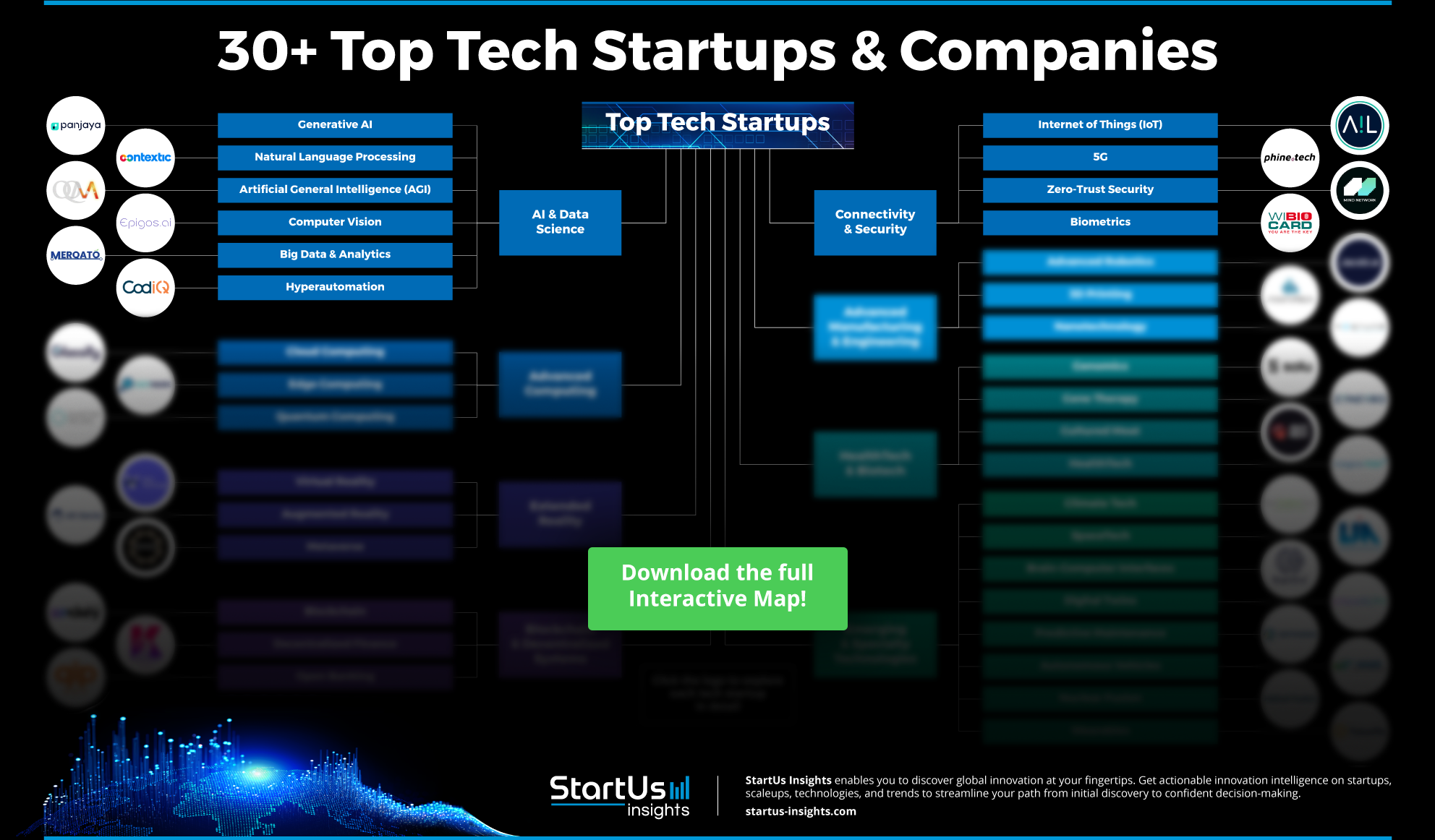
6. Blockchain

Technologies like distributed ledgers and smart contracts provide retailers with tamper-proof systems to track transactions and share data securely across a decentralized network. This results in improved supply chain visibility, fraud prevention, and data management. Retailers benefit from greater trust between consumers and manufacturers as blockchain enables product origin and authenticity tracking. Additionally, blockchain streamlines operational costs by automating payments and compliance management.
3 Practical Use Cases of Blockchain in Retail
- Supply Chain Transparency: By recording transactions in immutable ledgers, blockchain solutions offer real-time visibility into product movement. Retailers are able to track goods from production to sale. This improves supply chain efficiency and verifies the authenticity and origin of products.
- Anti-Counterfeiting: Blockchain creates a tamper-proof record of a product’s journey to verify each step. This prevents counterfeit goods from entering the supply chain and enhances the integrity of retail products.
- Secure Consumer Transactions: Encryption of consumer data and decentralized payment facilitates secure peer-to-peer (P2P) transactions. This eliminates the need for intermediaries and reduces the risk of data breaches while ensuring transaction authenticity.
Startup to Watch: QX
Based out of Poland, QX is a startup that offers a web3-powered brand loyalty platform. It utilizes tokenized rewards to enhance customer engagement for retail brands. Using self-sovereign identity (SSI) on the Polygon blockchain, QX allows users to earn, share, and stake tokenized rewards without compromising personal information. The system also integrates into existing brand ecosystems through OpenAPI. This enables a loyalty solution that supports NFTs, local collaborations, and dynamic incentives. QX empowers brands to enhance their loyalty programs and foster long-term customer relationships.
7. Internet of Things

IoT is advancing the retail industry by enhancing operational efficiency and customer experiences through interconnected devices and real-time data. Technologies like RFID sensors, smart shelves, and Bluetooth beacons enable retailers to monitor inventory, optimize store layouts, and track customer behavior. These systems automate tasks, reduce manual errors, and gain insights into shopping patterns to improve decision-making. Additionally, IoT enhances supply chain visibility and energy management by providing real-time data on product movement and store operations.
3 Practical Use Cases of IoT in Retail
- Smart Shelves: Use weight sensors and RFID tags to track inventory levels in real time and send automatic restocking alerts to reduce out-of-stock scenarios. Further, data integration with back-end systems enables precise inventory management and minimizes human intervention.
- Product Tracking: RFID and GPS-based solutions monitor product movement from warehouse to store. This real-time visibility streamlines inventory logistics, reduces shrinkage, and enhances accuracy in stock replenishment.
- Consumer Behavior Tracking: IoT sensors embedded in retail environments capture detailed data on consumer behavior, such as movement patterns and product interactions. This data is analyzed in real time for retailers to optimize store layouts, personalize marketing strategies, and adjust product placement to enhance customer engagement.
Startup to Watch: Acceliot
Acceliot is a US-based startup that advances retail asset visibility through its RFID-based platform, STARflex. This system enables real-time inventory tracking from stockrooms to storefronts to offer precise asset location while minimizing stock shortages. The STARflex reader is designed for indoor RFID tracking, where line-of-sight (LOS) issues, such as reflections from metal shelves, traditionally reduce read rates. It uses a patented architecture and iterative decoding to detect signals much weaker than standard readers and read tags over long distances in non-line-of-sight (NLOS) conditions. It also incorporates smart antenna techniques for location tracking and is optimized for high-density environments. This ensures enhanced wall-to-wall asset detection in complex retail setups.
8. Cloud Computing

Using cloud-based solutions, retailers are able to adjust IT resources without major hardware investments. Cloud infrastructure also supports real-time data processing to enable better decision-making in inventory management, pricing, and customer engagement. Additionally, cloud platforms streamline eCommerce operations by integrating sales channels, improving inventory visibility, and enhancing the customer experience. This integration across platforms simplifies complex operations so that retailers are able to provide an omnichannel experience whether customers shop online, in-store, or via mobile. The flexibility of cloud-based solutions also allows them to scale rapidly in the e-commerce space — driving competitive advantage in a digital-first market.
3 Practical Use Cases of Cloud Computing in Retail
- Cloud-based Inventory Management: By integrating data from multiple sales channels and centralizing them, cloud computing solutions enable real-time inventory tracking, automatic stock level alerts, and accurate demand forecasting. This reduces stockouts and overstock issues.
- eCommerce Platforms: Offer scalable infrastructure to support high traffic volumes and dynamic personalization. They integrate with various third-party services using APIs for payment gateways, shipping, and customer management, optimizing website performance.
- Customer Data Analytics: Cloud computing facilitates customer data analytics by providing scalable storage and processing power for large datasets. Retailers use real-time insights from consumer behavior analytics to optimize marketing strategies, personalize recommendations, and create targeted campaigns.
Startup to Watch: Cloud Retail
UK-based startup Cloud Retail provides a full-cycle eCommerce platform to optimize retail operations. Its store management feature incorporates real-time inventory tracking to shorten picker runs and boost accuracy through data-driven shelving and smart picking routes. The platform’s delivery software is equipped with smart ETA calculations and automated order processing, which enhances efficiency by batching orders and reducing late deliveries. For supply chain management, Cloud Retail uses predictive algorithms to automate replenishment as well as reduce stock shortages and wastage. Additionally, its integrated business intelligence tools provide data analytics and real-time reporting. This allows retailers to track performance metrics, optimize operations, and personalize customer experiences.
9. Biometrics

Biometric technologies are transforming retail by offering enhanced security and personalized customer experiences. Facial recognition, fingerprint scanning, and voice recognition enable convenient and secure customer identification. This enables personalized services while reducing fraud. The integration of biometric authentication enhances payment security by replacing traditional PIN codes with unique biological markers. This makes transactions more efficient and reduces checkout times. Additionally, biometrics streamline access control and enable retailers to tailor marketing strategies based on customer data to drive deeper engagement.
3 Practical Use Cases of Biometrics in Retail
- Secure Payment Systems: Biometric payment systems, including fingerprint scanning, facial recognition, and iris scanning, enhance transaction security by authenticating users based on unique biological traits. This reduces fraud risk and accurately verifies identity during POS transactions.
- Personalized Shopping: Retailers utilize biometric data like facial recognition and voice identification to analyze customer behavior and preferences in real time. By linking biometrics with purchase history, stores offer tailored product recommendations to enhance customer engagement.
- Customer Identification: Fingerprint recognition and facial scans enable retailers to identify customers quickly and accurately. This streamlines loyalty programs and fast-track check-ins, allowing for a more efficient shopping experience while enhancing security.
Startup to Watch: Youverse
Youverse is a startup from Portugal that simplifies shopper identification through its suite of biometric solutions. YouID enables user registration by verifying identities through face verification between live images and identity documents, with anti-spoofing checks and automated document optical character recognition (OCR) for added security. YouAuth ensures secure, privacy-preserving authentication with a decentralized architecture to enable integration with various identity providers. Finally, YouFace performs face processing, including detection, analysis, and verification, as well as supports face matching and identification across systems. These products advance online shopping, self-service checkouts, loyalty tracking, personalized shopping experiences, and staff access.
10. Connectivity Technologies

Connectivity technologies like 5G, Wi-Fi 6, and Bluetooth are transforming the retail industry by enhancing the speed, reliability, and efficiency of store operations. 5G’s ultra-low latency enables real-time data processing, essential for improving inventory management, optimizing logistics, and facilitating seamless mobile payments. Wi-Fi 6, with its enhanced capacity and faster speeds, supports high-density environments. Bluetooth enables proximity-based services like contactless payments and personalized customer interactions to improve in-store engagement.
3 Practical Use Cases of Connectivity Technologies in Retail
- In-store Wi-Fi & Connectivity: Retailers leverage in-store Wi-Fi and 5G networks to enhance customer experiences by enabling seamless mobile payments, personalized offers, and interactive product searches. These connectivity technologies also support backend systems by optimizing data collection through fast, low-latency communication.
- Real-Time Inventory Tracking: 5G, Wi-Fi, and Bluetooth technologies in retail settings enable real-time inventory tracking, providing accurate, up-to-the-minute stock levels across multiple locations. This allows retailers to prevent stockouts, optimize replenishment, and manage supply chain efficiency using precise data.
- Omnichannel Customer Engagement: Wi-Fi, 5G, and near-field communication (NFC) support omnichannel customer engagement by integrating in-store, online, and mobile experiences. These technologies allow retailers to provide consistent experiences, targeted promotions, and real-time support across various touchpoints.
Startup to Watch: Freebits
Indonesian startup Freebits offers a WiFi marketing platform that enhances customer engagement for retail businesses. The platform allows retailers to provide free WiFi to visitors, who log in through a branded captive portal using social media, email, or phone numbers. This process delivers internet access for customers while allowing businesses to collect valuable customer data, such as demographics and behavior, to create targeted marketing campaigns. With built-in analytics, businesses are able to gain insights into visitor patterns, send personalized promotions, and increase customer loyalty. The platform is hardware-neutral and integrates with existing systems, making it convenient for retailers to boost return visits and sales.
Outlook for the Retail Industry
Patents & Grants
Retail innovators hold over 54,500 patents and have secured more than 2,040 grants, showcasing the industry’s ongoing commitment to research and technological advancements.
For more actionable insights, download our free Retail Innovation Report.
Investment Landscape
A dynamic investment environment supports the industry, marked by over 62,000 funding rounds, with an average value of USD 48 million per round. The leading investors include Techstars, Y Combinator, Sosv, Antler, and Global Founders Capital. Whereas, the top funding types are Seed, Series A, Accelerator/Incubator, Pre-Seed, and Angel.
Global Footprint
Key country hubs driving retail innovation include the USA, UK, India, Canada, and Australia, with cities like New York, London, Sydney, Melbourne, and Dubai at the forefront of technological advancements in retail.
Leverage Emerging Retail Technology Solutions
Act now on the emerging technologies transforming the retail industry. With StartUs Insights, you swiftly discover hidden gems among over 4.7 million startups, scaleups, and tech companies, supported by 20,000 trends and technologies. Our AI-powered search and real-time database ensure exclusive access to innovative solutions, making the global innovation landscape easy to navigate.
Trusted by industry leaders like Samsung, Nestlé, and Magna, we provide unmatched data, a 360-degree industry view, and data-driven intelligence for confident strategic decisions. For example, here’s what Jürgen Ellmeier, Business Development & eCommerce Manager of Nestlé says about our platform, “StartUs Insights’ exhaustive insights give us a comprehensive understanding of FMCG Innovation Trends and helps us discover top startups.”
Like them, you can also leverage our innovation services to optimize costs, streamline operations, and stay ahead of the curve. Get in touch today to explore how our comprehensive innovation intelligence can drive your success.
Discover All Retail Technologies & Startups!

